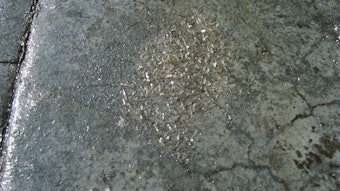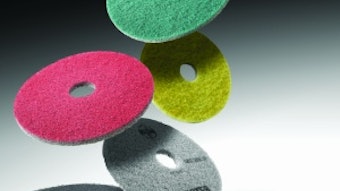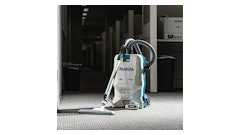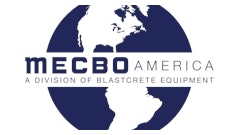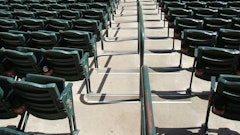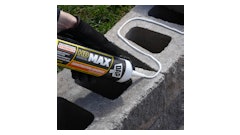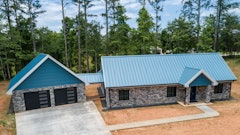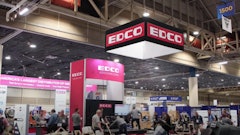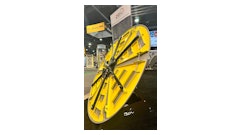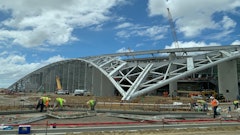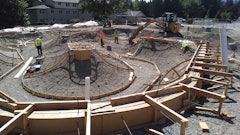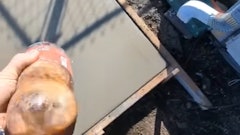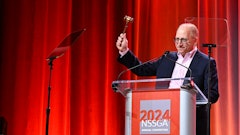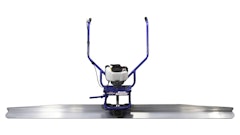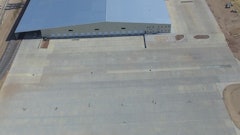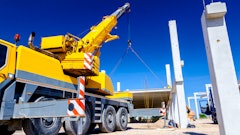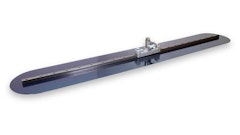
Crews with Ivan Rice & Sons typically see daily pours in the range of 20,000 to 30,000 square feet. But things got a little heated on the jobsite recently when owner Randy Rice decided to push his employees to complete a 60,000 square foot pour in one day. "A pour like this needs to be coordinated right to the finest detail," Rice says. "Coordination starts with making sure you are ready to pour - you have the proper amount of ready mix based on yards per hour and you have enough people and equipment on hand."
The Ivan Rice & Sons crews had been working on a 7-inch-thick slab at a 250,000-square-foot manufacturing and warehouse facility for a few days, going about with their average pours. A few things came together toward the end of the project, however, that led Rice to push his crews to finish up the job's remaining 60,000 square feet in one shot. First, his second crew was coming off another job so those men were available for the large pour. Second, time deadlines for the job were starting to tighten and Rice was feeling pressure to finish the slab as soon as possible.
The Ivan Rice & Sons supervisors coordinated with the concrete supplier to haul concrete from two plants to ensure they had the 150 to 170 yards an hour they needed to keep things rolling. They started the pour at 4 a.m. Rice had about 10 guys finishing the slab, and saw cutting started by 2 p.m. Crews were heading home by 8 p.m.
Rice had his second laser screed on the job as backup, knowing this piece of equipment was key to attaining this sort of productivity. "We couldn't have done a job of that size in one day without the laser screed - it saves a lot on labor," he says. "It probably would have taken us three days to lay that amount of concrete without it."
Despite the long hours and need for acute planning, Rice says more pours like this may be in his company's future. "With the lead people and employees I have, I would not hesitate to make pours of this size again," Rice says. "The pour could not have gone any better."
Conquering commercial
Ivan Rice & Sons is a commercial flooring contractor in Milton, Wis. Ninety percent of its work is floors, while the company also performs exterior flatwork, sidewalks, concrete paving, aprons and loading docks. It also has the equipment and skills to execute superflat floors.
The company has 23 employees and runs two flooring crews. Rice does all the estimating and has a two-person office staff.
Ivan Rice & Sons wasn't always a commercial flooring contractor. Rice's father started the company in the 1950s as a residential foundation contractor. In the 1980s, when the residential market dropped off, Ivan Rice & Sons took a turn toward light commercial work and flatwork and found it an easy sector for growth. It took the company about 10 years to transition into a commercial flatwork company at a level where Rice was comfortable with the client base and his crews' familiarization with the work.
Rice says once you start working in the commercial realm, you get caught up in a snowball effect and growth comes naturally. "When you hit the commercial market you start buying more equipment, and bigger equipment, and then it becomes a necessity to keep that equipment busy. You start growing and growing," he explains.
But jobs just don't fall into contractors' laps for no reason. "Over the years, we've built up customers and worked to keep them happy," Rice says. "They've remembered us and we get phone calls from those customers coming back to us when they have some work. They call me up, let me know about a new project they have and ask me to bid."
Rice has always believed in keeping up with technology in order to keep his crews productive and offer a finished product that customers remember. In the early 1980s he started working with lasers for leveling and finding grades. He says in some cases that type of equipment can allow one man to do the work of three. In 1989 Ivan Rice & Sons bought its first laser screed. "That piece of equipment allowed us to take a lot of the labor out of pouring concrete," Rice says. "And it allowed us to pour more on a per-day basis." Today Ivan Rice & Sons has two screeds, one for each of its crews.
"If you're going to be pouring a lot of concrete every day, you've got to have the equipment to keep things rolling on the jobsite," Rice explains. He says the increased production required them to keep several ride-on trowels in their equipment line-up. Early-entry saws became another essential tool for these high-production jobs, allowing crews to cut as soon as the slab is finished on the same day of the pour and saving them from having to return the next day for saw cutting. Another piece of equipment Rice says is essential to keeping things productive on the jobsite is his laser grader attachments for his skid steers. Each crew has its own skid steer and laser grader attachment, which allows them to perform fine grading at the jobsite on their own schedule and to their specifications. It also helps them save on concrete because their base is on grade.
Ivan Rice & Sons is typically hired as a subcontractor on its jobs. The details of the work are usually determined by an architect or engineer and spelled out in the project plans. But Rice says it's important to maintain a strong relationship with these people, and never be afraid to approach them if something in the plans seems inaccurate or if you know of a more efficient product or better way of doing things. "If you approach them in the right way, an architect or designer will listen to what you have to say, and sometimes you can even show them how an alternative might work better," he explains.
Maintaining a good relationship with designers can also lead to them coming to you. "Sometimes people will call us and ask my advice about what I think will work better for a certain project," Rice says. This helps contractors win a bid in the end if you can suggest a technique or product you're especially familiar with.
Today's issues
Rice says he's been very fortunate in today's economy, with sales tracking as planned. He encourages carpooling to jobsites to save money on gas and adds allowments for steel price adjustments in his contracts, but he says the commercial flatwork business in his region is running on a pretty even keel.
Rice has seen some recent trends in the market that have put pressures on commercial concrete contractors in other ways, though. "Over the years owners and architects have demanded tighter specifications for their floors, and contractors need the equipment and knowledge to achieve these floors," he says. "Owners also want their jobs turned around faster and faster."
While Rice says equipment is important in achieving a good project that meets today's tight specifications, he emphasizes that his employees are his biggest asset. He sends his guys to laser screed training and has them certified for finishing through the American Concrete Institute (ACI). He also says he has a lot of talented guys with common sense.
As Rice looks toward the future for his second-generation concrete company, he's pleased with how far it has come and the pace at which his business is running. Over the course of Rice being involved in the company he saw it transform from a residential foundation company into the commercial flatwork business he has today. Rice's two sons are learning the ropes of the business now. Rice says he's keeping things in the company the way they are for them with no plans to change the direction or scope of the business, but down the road when the sons someday take over the reigns Rice recognizes they might see opportunities for the company just as he did when he took over for his father.

